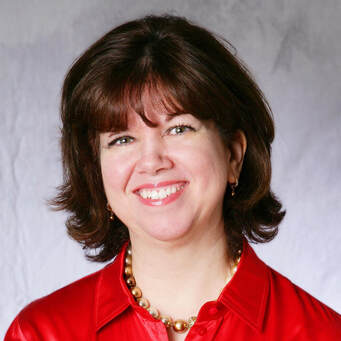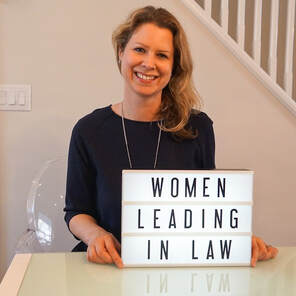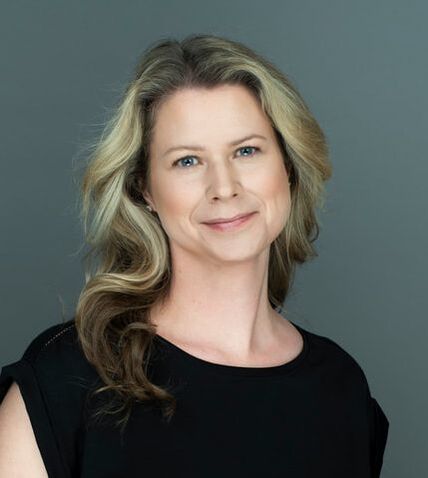 I am pleased to profile leading lawyer, advocate, and entrepreneur Lorin MacDonald. Read on for Lorin's story and advice: 1. Tell me a little about your practice or business. I was born with a profound hearing loss in both ears and have long been an advocate for inclusion. I have a niche human rights law practice focusing specifically on discrimination as experienced by people with disabilities. One of my cases related to the right to equal access to public washrooms being featured on the front page of the Toronto Star in 2017, leading to much discussion as it went viral around the world. However, change is at a glacial pace and it is frustrating, for both me and my clients, to experience the delays within the Human Rights Tribunal of Ontario. Due to my overriding desire to effect change that will benefit all Canadians, last year I created HearVue, a social enterprise to advance inclusive and accessible spaces. The initial vehicle was to highlight captioning at live events to demonstrate how it benefits all attendees – those living with hearing loss, English as a Second Language users, people with learning disabilities, and the wider audience. A month after launching, HearVue’s first trial event took place in Hamilton, Ontario with Michelle Obama. In the six months before COVID-19 shut down live events, HearVue’s captioning appeared before thousands, garnering rave reviews and building much-needed awareness. 2. Why did you go to law school? It was quite serendipitous. I was the Executive Director of a non-profit agency in Toronto when funding cutbacks resulted in closure. I moved back to my hometown of Port Dover, Ontario (a small town on the north shore of Lake Erie, approximately two hours south-west of Toronto) to regroup and consider my future plans. Unfortunately, shortly thereafter I was involved in a car accident that required extensive recovery time. My personal injury lawyer asked what my future plans were, and I mused about going back to school. He asked if I had ever thought about law school, said he thought I’d be good at it, and gave a plug for his alma mater, Western University. I thought, ‘How hard can that be?’, and only applied to Western as a mature student. As a long-time advocate for people living with disabilities, I knew that having a fuller understanding of the law would allow me to be more effective in enacting change. 3. How did you get to where you are today? Design? Chance? Both? Chance, with respect to deciding to go to law school. However, my time at Western was fraught with challenges. First, I needed to break ground to receive the appropriate form of accommodation for me, which was real-time captioning. After my first year at law school, I was diagnosed with cancer, so there were surgeries and treatments, pain and heartbreak from that point forward but I did finish, taking an extra 18 months to do so. My legal education paired with my passion for accessibility has proved invaluable as I do my small part to effect positive change, through my human rights law practice and my social enterprise. Out of pain, my passion grew and led to a plan. 4. What is your most significant achievement? What are you proud of? There are three events that hold a special place in my heart, all related to my passion for accessibility. The first, being part of a team the summer before law school that hosted a forum at Western University to encourage the provincial government that the Ontarians with Disabilities Act needed to be replaced with stronger accessibility legislation. The event took place at the end of my first week in law school in 2004 and was fully accessible – captioning, ASL interpreters, alternate formats, attendant care, water bowls for guide dogs – it was magical to see everyone be able to participate in such important advocacy. Six weeks after the forum, the Accessibility for Ontarians with Disabilities Act (AODA) was introduced and fast-tracked to unanimous passage in May 2005. The second achievement happened in March 2017 when my client’s fight for equal access to a restaurant washroom was featured on the front page of the Toronto Star. This led to much discussion and awareness as it went viral around the world. My most recent achievement occurred when I saw first the trial of HearVue’s captioning with Michelle Obama, then the full launch a week later. As I was listening to Haben Girma (the first Deafblind person to graduate from Harvard Law School) talk about the importance of captioning, tears were streaming down my face as her words were captured on the screen by my social enterprise! Several events ensued and I was delighted to hear many attendees say how much they benefited from it. 5. What are some key challenges, and more importantly, opportunities for women in law? I have good authority to speak about the challenges of being a woman with a sensory disability in the practice of law. The challenges are many. Because sensory disabilities related to hearing and sight rely heavily on people and developing technology, it can take longer to get the same results. Attitudes are difficult to overcome, as people have preconceived ideas of what you can (and cannot) do. I have also found it very challenging with the medical model vs. the social model of disability is employed; those of us living with disabilities need to be “fixed” so that we fit into the mold of “normal” society. This is so limiting; it’s far better to recognize how varied perspectives are invaluable in a diverse society. However, I have personally found that “diversity & inclusion” initiatives often do not include disabilities, be they visible, invisible, or episodic. And these challenges are why I persist, to gently (and sometimes not so gently!) encourage people to get on board so we can get on with the job. It’s only a big deal if you make it one. 6. What advice would you give a woman starting her legal career? Mentorship is key. Join your provincial Bar Association in law school, then your local law associations as well as professional associations. Show up for learning opportunities. Network, network, network. And add value to your connections. Did you come across an article that may be of interest to a colleague? Send it along with a note. Do you see an opportunity to connect two colleagues to each other? Don't hesitate. Always be kind within the legal profession - it is surprisingly small. To quote the late Maya Angelou: "I've learned that people will forget what you said, people will forget what you did, but people will never forget how you made them feel." Go out of your way - it will serve you well! ------------------------------------------------------------------------------------------------------------------------------------------- Thank you Lorin for sharing your story and advice to the readers of this blog. I really appreciate it. Lorin was also recently nominated (along with several other Women Leading in Law ladies) for the Canadian Lawyer Magazine's Top 25 Most Influential Lawyers award under the "Human Rights" category for her work as a human rights lawyer focusing specifically on discrimination as experienced by people with disabilities. Congratulations! Voting open until June 5th: here. I started this blog series because I was tired of hearing about women leaving law and wanted to hear about women leading in law. The "Women Leading in Law" series focuses on good news stories and highlights amazing women succeeding in the legal profession. Each post includes the profiled lawyer's answers to six questions. Prepare to be inspired! ICYMI - previous posts profiled the following amazing lawyers: Karen Yamamoto, Victoria Crewe-Nelson, Lynne Vicars, Kemi Oduwole, Anne-Marie McElroy, Jennifer Gold, Jordana Goldlist, Megan Keenberg, Yadesha Satheaswaran, France Mahon, Sarah Molyneaux, Richa Sandill, Vivene Salmon, Kim Whaley, Alisia Grenville, Frances Wood, Maggie Wente, Anita Szigeti, Neha Chugh, Christy Allen & Nancy Houle, Suzie Seo, Kim Gale, Alexi Wood, Melissa McBain, Erin Best, Gillian Hnatiw, Melanie Sharman Rowand, Meg Chinelo Egbunonu, Lisa Jean Helps, Nathalie Godbout Q.C., Laurie Livingstone, Renatta Austin, Janis Criger, May Cheng, Nicole Chrolavicius, Charlene Theodore, Dyanoosh Youssefi, Shannon Salter, Bindu Cudjoe, Elliot Spears, Jessica Prince, Anu K. Sandhu, Claire Hatcher, Esi Codjoe, Kate Dewhirst, Jennifer Taylor, Rebecca Durcan, Atrisha Lewis, Vandana Sood, Kathryn Manning, Kim Hawkins, Kyla Lee, and Eva Chan.
7 Comments
5/24/2020 01:10:31 am
Thank you so much for sharing, Lorin. This is really inspiring!
Reply
Janet Rivers
9/18/2020 04:01:26 pm
Can you put me in touch with Lorin?
Reply
Erin
9/25/2020 08:28:05 am
Hi Janet, The best way to contact Lorin is either connect with her on LinkedIn or you can email her at lorin@hearvue.com.
Reply
12/9/2020 12:29:05 am
Hey thanks for posting this useful information about the women leading in law lorin MacDonald, I really hope it will be helpful to many. It will help a lot; these types of content should get appreciated. I will bookmark your site; I hope to read more such informative contents in future. Appreciative content!!
Reply
9/20/2021 08:12:03 am
Thanks for sharing such nice post about the leadership of the woman in law and how they handle the organization.
Reply
11/4/2022 05:07:48 am
BRILLIANT post! Thank you. There should be more individuals like you in the world. Thank you for sharing your knowledge and wisdom.
Reply
Your comment will be posted after it is approved.
Leave a Reply. |
Erin C. Cowling is a former freelance lawyer, entrepreneur, business and career consultant, speaker, writer and CEO and Founder of Flex Legal Network Inc., a network of freelance lawyers.
Categories
All
Archives
April 2022
|
|
(C) 2014-2024 Cowling Legal. All rights reserved.
|
Please note I do not represent legal clients of my own and I am no longer taking on freelance lawyer projects for other lawyers at this time.
Information on this website does not constitute legal advice and is for informational purposes only. Accessing or using this website does not create a solicitor-client relationship. See website Terms of Use/Privacy Policy. info@cowlinglegal.com
3080 Yonge Street, Suite 6060 Toronto,ON M4N 3N1 (appointment only) |







 RSS Feed
RSS Feed
